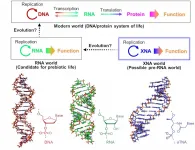Canada-wide ban on menthol cigarettes leads to significant increases in quitting among smokers
2021-04-06
(Press-News.org) Bans on menthol cigarettes across Canada from 2016 to 2017 led to a significant increase in the number of smokers who attempted to quit, smokers who quit successfully, and lower rates of relapse among former smokers, according to a new research study from the International Tobacco Control Policy Evaluation Project (the ITC Project) at the University of Waterloo.
Menthol is the most common flavoring for cigarettes in many countries. Menthol creates a cooling sensation, which reduces the harshness of cigarette smoke. Because of this, menthol leads to increased experimentation and progression to regular smoking among new smokers, especially among youth.
"Our study demonstrates the substantial benefits of banning menthol cigarettes," said Geoffrey T. Fong, Professor of Psychology and Public Health and Health Systems at Waterloo, and principal investigator of the ITC Project. "The enormous success of the Canadian menthol ban makes it even clearer now that the U.S. should finally ban menthol, which the tobacco industry has used for decades to attract new smokers and to keep many of them as customers, especially among the African-American community.
"The positive effects of the Canada menthol ban suggest that a U.S. menthol ban would lead to greater benefits since menthol cigarettes are much more popular in the U.S. From our findings, we estimate that banning menthol cigarettes in the U.S. would lead an additional 923,000 smokers to quit, including 230,000 African-American smokers."
The study conducted by Fong and his team examined the impact of menthol bans across seven Canadian provinces, covering 83 per cent of the Canadian population, which saw menthol cigarettes banned between August 2016 and October 2017. Canada was the one of the first countries to implement a ban on menthol cigarettes, and the first country where a menthol ban has been evaluated.
"The Canadian menthol ban did not lead to a high level of illicit menthol cigarette purchasing, which has been a concern by regulators considering a menthol ban," said Fong. "Fewer than 10 per cent of menthol smokers reported still smoking a menthol brand after the ban."
Scientific reviews conducted by the Tobacco Products Scientific Advisory Committee to the U.S. Food and Drug Administration (FDA), the FDA itself, and the World Health Organization have also concluded that banning menthol would have significant public health benefits.
The harms of menthol cigarettes in the U.S. have been much greater among African-Americans. Menthol cigarettes are smoked by 85 per cent of African-American smokers, over 2.8 times the percentage of menthols among white smokers.
A national sample of 1098 non-menthol and 138 menthol smokers participating in the ITC Canada Smoking and Vaping Survey were surveyed both before the menthol ban (in 2016) and after the menthol ban (in 2018).
The survey demonstrated three benefits of the Canadian menthol ban. Menthol smokers were significantly more likely than non-menthol smokers to attempt to quit after the menthol ban (58.7 per cent vs. 49 per cent).
Daily menthol smokers were almost twice as likely than daily non-menthol smokers to quit after the menthol ban (21 per cent vs. 11.6 per cent).
Finally, those menthol smokers who had quit smoking before the menthol ban were significantly less likely than non-menthol smokers who had quit smoking to have relapsed back to smoking.
INFORMATION:
The study, Evaluating the impact of menthol cigarette bans on cessation and smoking behaviours in Canada: longitudinal findings from the Canadian arm of the 2016-2018 ITC Four Country Smoking and Vaping Surveys, was published today in the journal Tobacco Control.
ELSE PRESS RELEASES FROM THIS DATE:
2021-04-06
New research from UVA Cancer Center could rescue once-promising immunotherapies for treating solid cancer tumors, such as ovarian, colon and triple-negative breast cancer, that ultimately failed in human clinical trials.
The research from Jogender Tushir-Singh, PhD, explains why the antibody approaches effectively killed cancer tumors in lab tests but proved ineffective in people. He found that the approaches had an unintended effect on the human immune system that potentially disabled the immune response they sought to enhance.
The new findings allowed Tushir-Singh to increase the approaches' effectiveness significantly in lab models, reducing tumor size and improving overall survival. The promising results suggest the renewed potential for the strategies in human patients, he and his ...
2021-04-06
Seafood is a pillar of global food security--long recognized for its protein content. But research is highlighting a critical new link between the biodiversity of aquatic ecosystems and the micronutrient-rich seafood diets that help combat micronutrient deficiencies, or 'hidden hunger', in vulnerable populations.
"Getting the most nutritional value per gram of seafood is crucial in fighting hidden hunger and meeting United Nations Sustainable Development Goals," says Dr. Joey Bernhardt, an ecologist from the University of British Columbia (UBC) who led the study, published this week in the Proceedings of the National ...
2021-04-06
Nagoya University scientists in Japan have demonstrated how DNA-like molecules could have come together as a precursor to the origins of life. The findings, published in the journal Nature Communications, not only suggest how life might have begun, but also have implications for the development of artificial life and biotechnology applications.
"The RNA world is widely thought to be a stage in the origin of life," says Nagoya University biomolecular engineer Keiji Murayama. "Before this stage, the pre-RNA world may have been based on molecules called xeno nucleic acids ...
2021-04-06
Tsukuba, Japan - Many life forms use light as an important biological signal, including animals with visual and non-visual systems. But now, researchers from Japan have found that neuronal cells may have initially evolved to regulate digestion according to light information.
In a study published this month in BMC Biology, researchers from the University of Tsukuba have revealed that sea urchins use light to regulate the opening and closing of the pylorus, which is an important component of the digestive tract.
Light-dependent systems often rely on the activity of proteins in the Opsin family, and these are found across the animal kingdom, including in organisms with visual and non-visual systems. Understanding ...
2021-04-06
LOS ANGELES (April 5, 2021) -- New research from the Smidt Heart Institute shows that more patients--specifically those with medical risk factors or from underserved communities--opted into telehealth appointments for their cardiovascular care during the COVID-19 pandemic. The data also suggests these telehealth patients underwent fewer diagnostic tests and received fewer medications than patients who saw their doctors in person.
The findings, published in JAMA (Journal of the American Medical Association) Network Open, point to "digital shifts" in cardiovascular care amid the ongoing COVID-19 pandemic.
"We were encouraged to learn that access to cardiovascular ...
2021-04-06
DURHAM, N.C. -- Emily Ury remembers the first time she saw them. She was heading east from Columbia, North Carolina, on the flat, low-lying stretch of U.S. Highway 64 toward the Outer Banks. Sticking out of the marsh on one side of the road were not one but hundreds dead trees and stumps, the relic of a once-healthy forest that had been overrun by the inland creep of seawater.
"I was like, 'Whoa.' No leaves; no branches. The trees were literally just trunks. As far as the eye could see," said Ury, who recently earned a biology Ph.D. at Duke University working with professors Emily Bernhardt and Justin Wright.
In bottomlands throughout the U.S. East ...
2021-04-06
Tsukuba, Japan - With a prevalence of about one in 10 people worldwide, chronic kidney disease (CKD) is a global health problem. It also often goes undetected, leading to a range of negative health outcomes, including death. Catching it at an early stage and adjusting nutrition and lifestyle can improve and extend life, but only if there are economically feasible systems in place to promote and educate on this.
Amid finite health-care resources, any CKD intervention must be both practical and cost-effective. A team of researchers centered at the University of Tsukuba now believe they have found a CKD behavioral intervention that can be delivered at a reasonable cost. They published their findings in the Journal of Renal Nutrition.
Changing eating and lifestyle habits, and ...
2021-04-06
For the implementation of the effective hydrogen economy in the forthcoming years, hydrogen produced from sources like coal and petroleum must be transported from its production sites to the end user often over long distances and to achieve successful hydrogen trade between countries. Drs. Hyuntae Sohn and Changwon Yoon and their team at the Center for Hydrogen-fuel Cell Research of the Korea Institute of Science and Technology (KIST) have announced a novel nanometal catalyst, constituting 60% less *ruthenium (Ru), an expensive precious metal used to extract hydrogen via ammonia decomposition.
*Ruthenium is a metal with the atomic number 44, and is a hard, expensive, silvery-white member of the platinum group of elements.
Ammonia has recently emerged as a liquid storage and transport ...
2021-04-06
Epidemiological studies have found that transportation noise increases the risk of cardiovascular morbidity and mortality, with high-quality evidence for ischaemic heart disease. According to the WHO, ?1.6 million healthy life-years are lost annually from traffic-related noise in Western Europe. Traffic noise at night causes fragmentation and shortening of sleep, elevation of stress hormone levels, and increased oxidative stress in the vasculature and the brain. These factors can promote vascular dysfunction, inflammation and hypertension, thereby elevating the risk of cardiovascular ...
2021-04-06
Humans have altered the ocean soundscape by drowning out natural noises relied upon by many marine animals, from shrimp to sharks.
Sound travels fast and far in water, and sea creatures use sound to communicate, navigate, hunt, hide and mate. Since the industrial revolution, humans have introduced their own underwater cacophony from shipping vessels, seismic surveys searching for oil and gas, sonar mapping of the ocean floor, coastal construction and wind farms. Global warming could further alter the ocean soundscape as the melting Arctic opens up more ...
LAST 30 PRESS RELEASES:
[Press-News.org] Canada-wide ban on menthol cigarettes leads to significant increases in quitting among smokers







